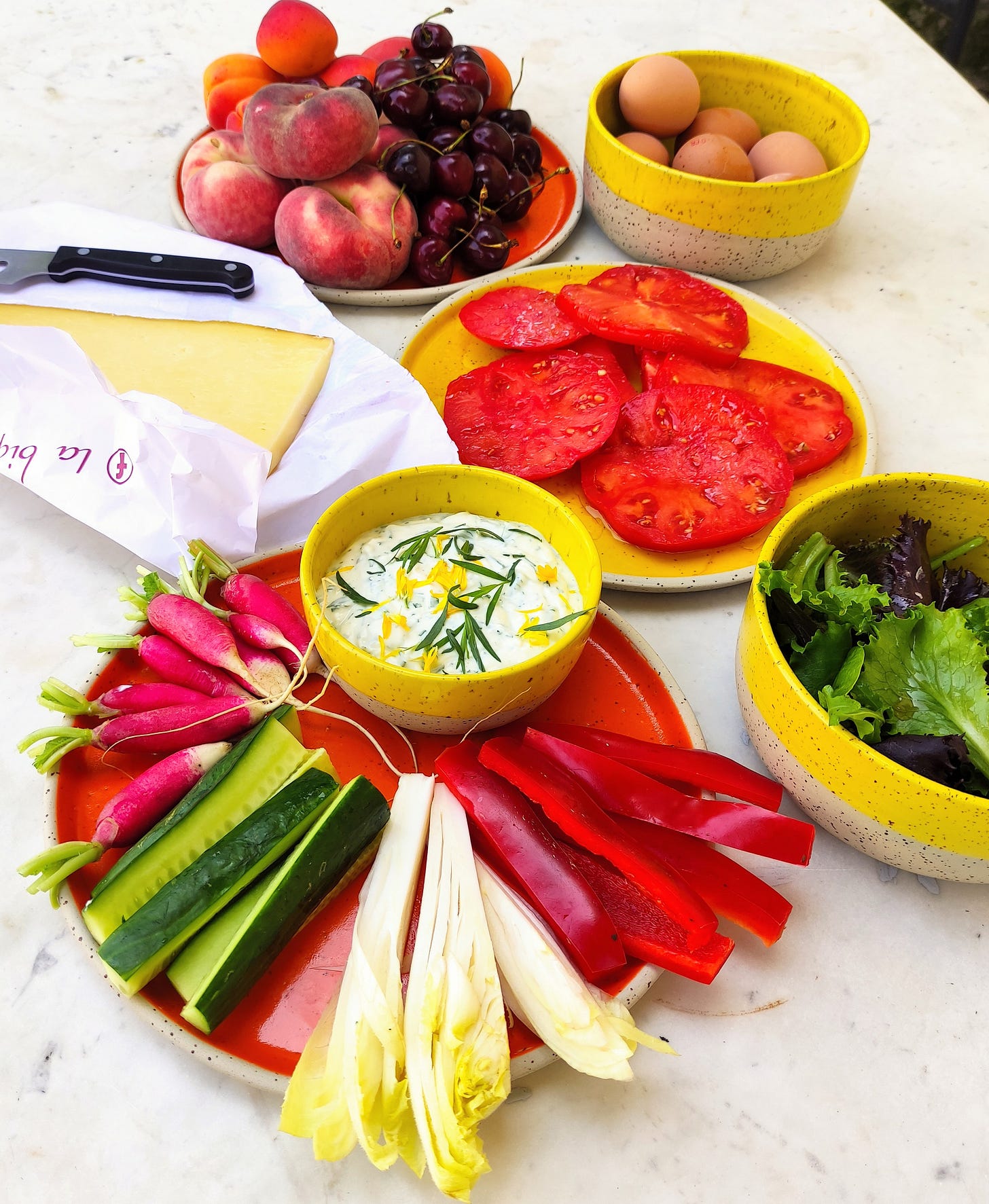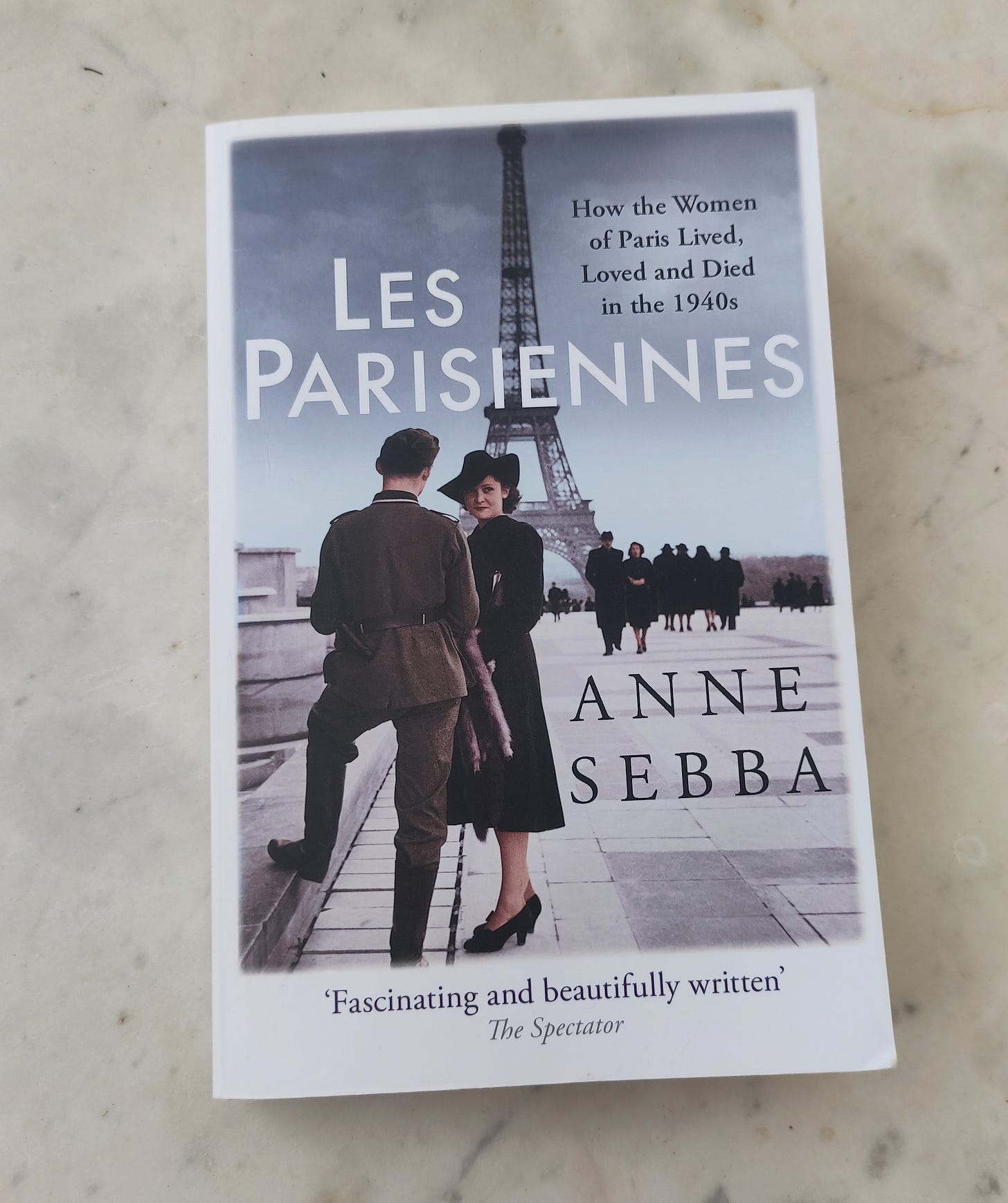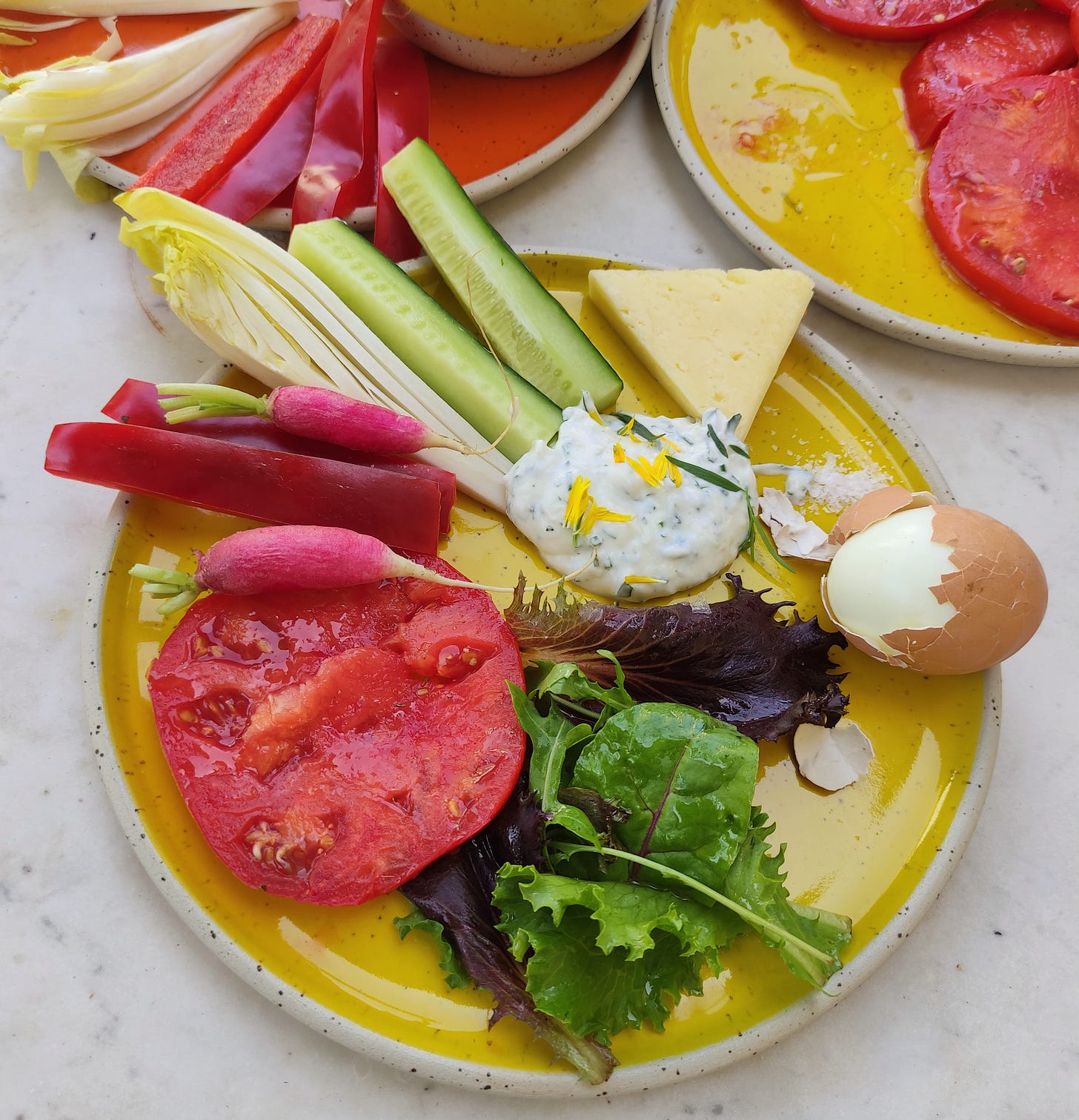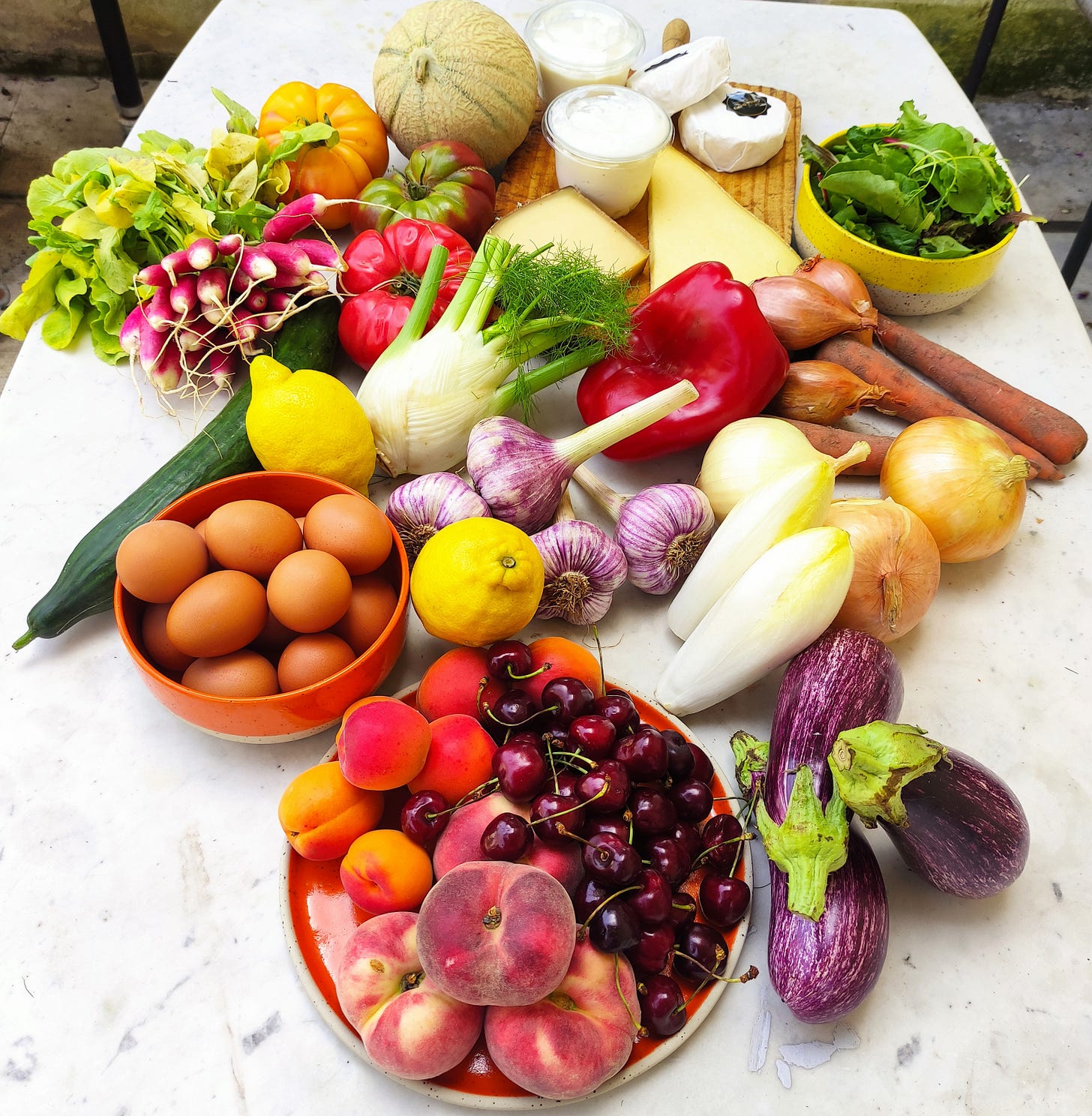When in doubt, putain
Today, an introduction to French swearing, plus a no-cook lunch that’s perfect for hot days.

I’m trying something new today. If you’d like to listen to me rather than read me, I’ve recorded this post. Tune in for swearing in French and English, and do let me know in the comments if it’s something you’d like me to do more often. The recording, not the swearing.
Yesterday, I was walking along Boulevard Lamartine towards the market. At 9am, it was 32C and the effort of pulling my empty shopping trolley along the pavement already felt, well, like too much of an effort. I was mentally crossing things off my shopping list to save the grand exertion of hauling it all home. Sometimes, I feel like the kitchen Sisyphus, condemned forever to wander between greengrocers’ and house for all eternity.
Just as I was feeling very noble, a tanned man in shorts and a vest emerged from the shade of Avenue André Chassefière. “Oh, putain!” he said, as he emerged into the sun’s full glare.
I instantly loved this irritated stranger for using one of my favourite French words
Putain!
If you translate it literally, putain means whore, but you’d never guess it from the way the French use it, which is frequently and with great enthusiasm. It’s used to express anger, irritation, surprise, joy, sadness, and pretty much every emotion in between. Spilt red wine down your white shirt? Someone cut you up on the motorway? Won fifty quid at the races? Putain! Putain! Oh putain!
For your French swearing homework today, you should know putain is often combined with that other French favourite, merde…
I was at a party recently where I took my best purchase of the summer so far, an orange paper fan with PUTAIN DE CHALEUR in bold black type across the front: It’s fucking hot. Admittedly, when I found myself talking to the mayor, I turned that side of the fan to face me, not Monsieur le Maire, but it doesn’t have the shock value it might have in England. In most contexts, it’s as mild as saying damn, though depending on your mayor, you might want to save his or her more tender sensibilities.
For your French swearing homework today, you should know putain is often combined with that other French favourite, merde, or shit, in the excellent phrase “Putain de merde”. “Putain de bordel de merde” is for the advanced class only. Don’t mind me, I’m just sitting here waiting for the perfect occasion to use it.
When I got home from the market, exhausted from being charmed by swearing and picking ripe peaches, it was so hot – I’m sweating my palms off typing this – you couldn’t have paid me in Beyoncé tickets to fire up the stove. I exhausted myself chopping some herbs, grating garlic, stirring them into fromage blanc and arranging them on a plate with radishes, endive, cucumber and peppers. I tossed a green salad and slung some good olive oil and Maldon salt over sliced tomatoes, then put a slab of Cantal cheese on a wooden board, and some eggs I’d boiled the night before into a bowl. I washed peaches, cherries and apricots and laid it all out on the little terrace at the back of the house just by the kitchen door. There’s always some shade here, and often a breeze. Putain, life is good.
On radishes
I saw some radishes on a stall, scarlet with white tips. I felt cooler just to look at them. Their leaves were wilted – weren’t we all – and yellowing a little, but I tucked them into my basket anyway. No radish left behind. As I did, one of the many old ladies who rule this village said, “Ah no, you don’t want the ones with yellowing leaves, they’re too hot”. Now, I have long come to realise that to many French people, anything more extravagant than a pinch of piment d’Espelette or years-old curry powder is an act of grave folly, an assault on the finer senses. “Ça pique!” It stings, or it burns. I have missed fiery English radishes since I came here – the French ones are milder, naturally – so she instantly made me want them more. She fished around in the bottom of the wooden crate to find two orphan radishes, which had become unmoored from their bunches. She bit into one and handed me the other. We tasted. “Oh, it’s a little hot, but it’s not bad,” she said, and we both moved on to the melons. Next week, vindaloo.
What I’m reading…
When I’m in London, my friends tease me about seeking out great French restaurants, of which there are now many. Bouchon Racine is my favourite, if you’re wondering. So I imagine it’ll raise a laugh that when I was in London last week, I headed to Daunts bookshop on Marylebone High Street and stocked up on books about France. The one I’m reading first – started on the plane home, can’t stop reading it – Les Parisiennes: How the Women of Paris Lived, Loved and Died in the 1940s by Anne Sebba is a remarkable story of survival, heroism, collaboration, defiance and resistance. It’s told with enormous nuance and scholarship, and includes many fascinating details about the beginning of the Occupation, such as the cylindrical handbags created by the House of Lanvin, designed to hold gas masks and instantly much coveted by smart Parisiennes. She also writes about how, for some women, "Having family cutlery melted down in order to create a stylish bag or brooch, or buying leg-paint to simulate stockings, was sometimes more important than buying food." She describes how, as the war went on, life became much darker. “Nobody could be trusted, denunciations were rampant and bellies were filled with foreboding and fear”. Her book is giving me a much deeper understanding of the long shadow the Second World War casts on French society, even to this day.
Herb garden dip with crudités
When I came back from London, all the herbs in my garden had doubled in size. Some of them needed a stern chopping to halt them going to seed. I made this dip with the guilty. Let that be a lesson to my enemies.
I use lots of herbs here, but you could just use loads of chives if that’s what you’ve got, leave out the tarragon if you don’t like it, add chervil or dill if you have them. In short, make it your own. I use this combination most often as a dip, but it works very well as a dressing for a cucumber salad or stirred through roughly chopped tomatoes.
Serves 4 with crudités
300g fromage blanc, or Greek yogurt
1 medium-sized garlic clove, halved, any green germ removed, and either finely grated or finely chopped
Finely grated zest of an unwaxed lemon – be careful not to remove any of the bitter, white pith
1 tsp white wine vinegar or cider vinegar
3-4 tbsp finely chopped chives
2 tbsp finely chopped parsley
1 tbsp chopped coriander
1 tsp chopped tarragon leaves
6 mint leaves, chopped
¼ - ½ tsp salt
For the crudités
A selection of cucumbers, peppers, endive, carrots, radishes, or whatever squeaky-fresh vegetables you can find.
Chop and grate everything for the dip and stir it into the fromage blanc or yoghurt. Let it sit for 15 minutes, or up to a day – I’ve kept it in the fridge for a few days and it’s not terrible, it just loses a little of its fresh, herby zing. Put the dip in a bowl and serve it on a plate or platter with the crudités. I scattered on some marigold petals, because they were also rampant in the garden and needed to be taught a lesson, but this is not essential.
Printable Recipe
Market haul, 24 June, 2025
This week’s market haul comprises: flat peaches, apricots, cherries, 13 eggs, as is traditional, lemons, a cucumber, radishes, tomatoes, a Charentais melon, two pots of fromage blanc, two rounds of goat’s cheese, a slab of Cantal cheese and a slab of 24-month-old Comté, a salad of young leaves, shallots, some sand carrots, sweet onions, aubergines, endive, some new garlic, a red pepper, and a bulb of fennel.








Talking, swearing and food...perfect! You are such a treasure. Thanks. And another serving , please.
In today's context my favourite use of putain is 'Ce putain de Putin'